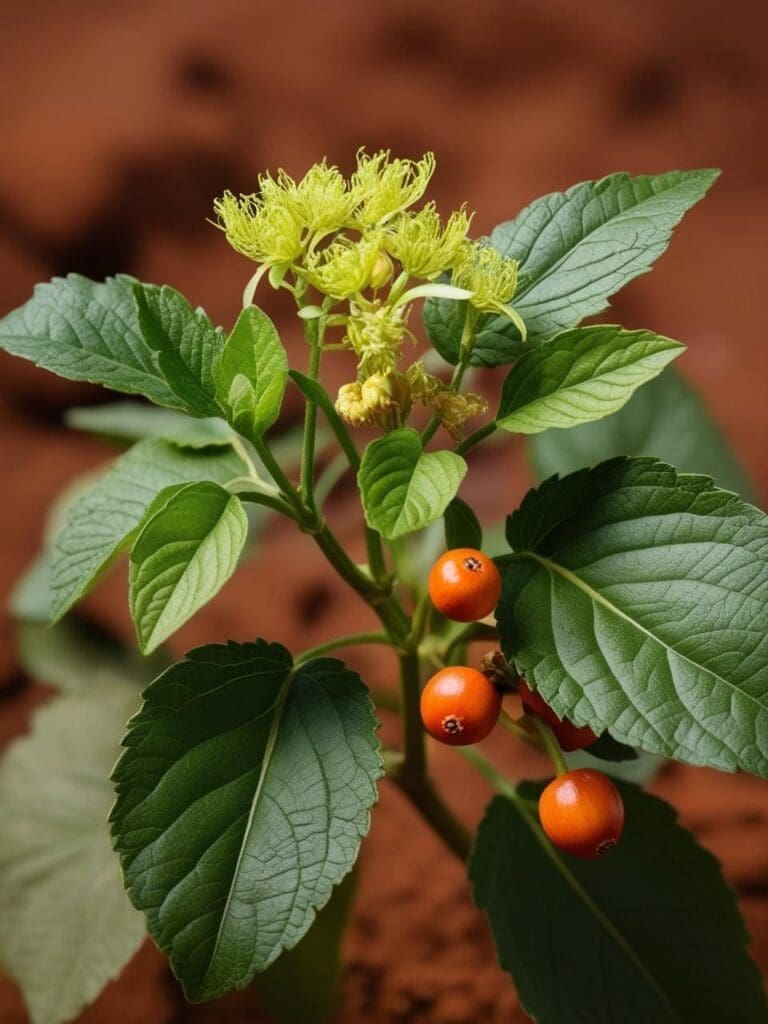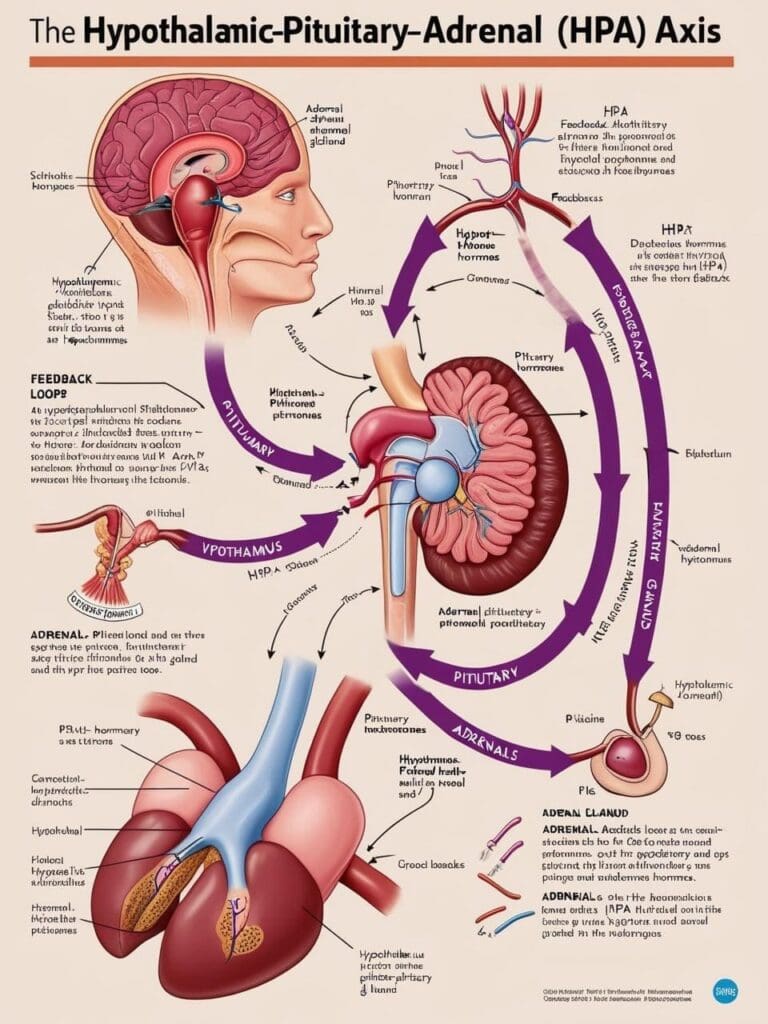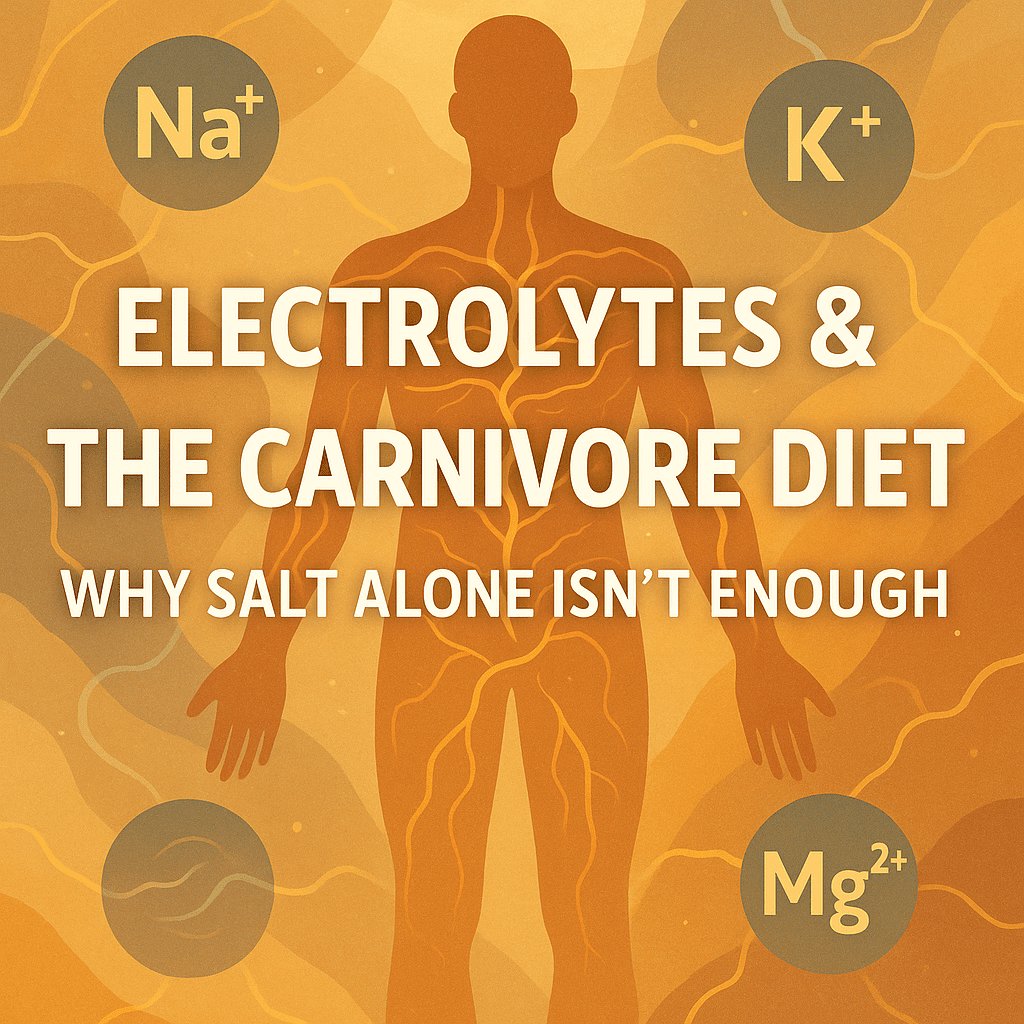Table of Content
| Section | Details |
|---|---|
| Introduction | Overview of Ashwagandha and its benefits. |
| Mechanisms of Action | How ashwagandha works in the body. |
| Evidence-Based Benefits | Research findings on testosterone, mood, and wellness. |
| Side Effects and Risks | Potential side effects and precautions. |
| Synergies and Interactions | Combinations with other supplements and interactions. |
| Anecdotal and Lesser-Discussed Effects | Lesser-known effects and user experiences. |
| Deep Dive Podcast | Our Ai co hosts discuss this article. |
| Where to Buy | Where to buy Ashwagandha. |
| FAQ | Frequently asked questions about Withania somnifera |
| Related Studies | Relevant research and trials supporting the herb’s benefits. |
Introduction
Ashwagandha is an ancient Ayurvedic herb renowned for its adaptogenic properties and wide-ranging health benefits. Often called “Indian ginseng” or “winter cherry,” this shrub’s roots and leaves have been used for centuries to increase vitality, reduce stress, and enhance reproductive health. Modern wellness enthusiasts praise ashwagandha for its potential to boost testosterone, improve energy levels, and sharpen libido in both men and women. It achieves these effects in part by helping the body better cope with stress – a key factor that can influence hormonal balance. Below, we delve into how ashwagandha works in the body, the evidence behind its benefits, safety and side effects, synergies with other supplements, and some lesser-known perks of this popular herb.

Mechanisms of Action

Ashwagandha’s most well-known mechanism is its role as an adaptogen, meaning it helps modulate the body’s stress response. Chemically, ashwagandha is rich in withanolides, which are thought to impact the hypothalamic-pituitary-adrenal (HPA) axis and other systems. One plausible mechanism is that certain withanolides interact with GABA receptors in the hypothalamus, promoting a calming effect that can facilitate the release of GnRH (gonadotropin-releasing hormone). This, in turn, stimulates the pituitary to secrete luteinizing hormone (LH), signaling the testes to produce testosterone. In essence, ashwagandha may indirectly boost testosterone by reducing stress signals and nudging the endocrine system towards balance.
Another key action is cortisol reduction. By binding to receptors in the brain (including potential interactions with the glucocorticoid receptor), ashwagandha can blunt excessive cortisol release. Lower cortisol is beneficial for testosterone because high stress hormone levels often suppress testosterone production. Additionally, ashwagandha has antioxidant and anti-inflammatory effects. It increases levels of natural antioxidants (like superoxide dismutase and glutathione peroxidase) and can reduce markers of inflammation. This creates a more favorable internal environment for hormonal health, as oxidative stress and inflammation can impair testosterone synthesis and sperm quality.
Ashwagandha’s impact on the nervous system also contributes to its libido and wellness benefits. It can promote better sleep by influencing GABAergic pathways. Improved sleep and relaxation further support healthy testosterone levels and sexual function, since poor sleep is linked to lower testosterone. In women, ashwagandha’s balancing effect on the HPA axis and sex hormones may play a role in improving arousal and satisfaction, though research in females is still emerging. Overall, ashwagandha works holistically – by calming the mind, reducing stress hormones, and supporting endocrine function, it sets the stage for enhanced energy, libido, and hormonal equilibrium.
Evidence-Based Benefits
Ashwagandha’s reputation is backed by a growing body of scientific studies, including human trials. Research suggests notable benefits for testosterone levels, fertility, strength, and mood:
Increased Testosterone and Fertility
Multiple clinical trials have found that ashwagandha supplementation can significantly increase testosterone in men. For example, in one trial of healthy adult men, 8 weeks of ashwagandha raised testosterone and DHEA levels while also improving muscle strength and size. In infertile men, ashwagandha has been even more impactful: one study reported increased LH and testosterone along with improved sperm count and motility. These changes coincided with higher pregnancy rates in the partners of men taking ashwagandha, indicating a tangible boost to fertility.
Stress Reduction and Mood
Ashwagandha’s adaptogenic prowess is well documented. In adults with chronic stress, it has been shown to lower morning cortisol significantly and reduce anxiety levels. Participants often report better mood and a greater sense of well-being. These stress-relief benefits likely contribute to the herb’s pro-testosterone effects, since lowering cortisol can remove an inhibitory weight off the body’s testosterone production. Additionally, some research indicates ashwagandha can improve symptoms of depression and help with mental focus, though more studies are needed on cognitive benefits.
Strength, Muscle and Exercise Performance
Ashwagandha is gaining popularity among athletes and fitness enthusiasts. Randomized trials have shown improvements in muscle strength and recovery. In a notable study, young men doing resistance training who took ashwagandha (600 mg/day) for 8 weeks saw greater gains in muscle size and strength compared to placebo, along with a rise in testosterone. Another placebo-controlled study found enhanced cardiorespiratory endurance (VO₂ max) and reduced exercise-induced muscle damage in the ashwagandha group. These findings align with its traditional use as a rejuvenating tonic (“rasayana”) to improve physical vitality.
Sexual Health and Libido
Ashwagandha has long been regarded as a natural aphrodisiac in Ayurvedic medicine, sometimes referred to as giving the “strength of a stallion.” Modern evidence lends credence to this, especially in cases of sexual dysfunction related to stress or fatigue. By raising testosterone and enhancing nitric oxide production, ashwagandha may improve libido and erectile function indirectly. A meta-analysis of herbal remedies for male sexual health found ashwagandha supplementation linked to increased sexual desire and satisfaction in men. Interestingly, preliminary research in women suggests it might help with arousal and orgasm by reducing anxiety and improving hormonal balance, although more robust female-focused studies are needed.
General Wellness – Sleep, Immunity, Thyroid
Beyond the gym and bedroom, ashwagandha contributes to general wellness. Its GABA-mimicking activity can promote better sleep quality, as seen in trials where it improved sleep onset latency and overall sleep efficiency. Better sleep not only aids recovery but also supports healthy hormone levels. Ashwagandha may also support thyroid function in subclinical hypothyroid patients (by raising T4 levels), and it exhibits immune-boosting and anti-inflammatory effects that could translate to improved resilience. These broader benefits make ashwagandha an appealing all-around health supplement.
Shop for Ashwagandha on Amazon. Consider buying KSM 66 for a more standardised product. All purchases through this link earn a small affiliate commision, at no extra cost to you.
🇬🇧 UK Visitors – Click here to buy Aswagandha
🇺🇸 US Visitors – Buy Aswagandha Here

Side Effects and Risks
Ashwagandha is generally considered safe for most people when used at recommended doses, but it can cause side effects in some cases. Being a bioactive herb, it’s important to use it responsibly and be aware of potential risks:
- Common Mild Side Effects: Some users experience gastrointestinal discomfort, including nausea, diarrhea, or stomach upset. Taking ashwagandha with food can mitigate these GI issues. Mild sedation or drowsiness is another common effect – in fact, many people take it in the evening to help unwind. Occasionally, headaches can occur, or anecdotally, vivid dreams due to its calming impact on the nervous system.
- Hormonal Interactions: Because ashwagandha can increase testosterone levels, it may interact with certain hormone-sensitive conditions or medications. For example, individuals on testosterone replacement therapy or those with hormone-dependent cancers should use caution. There’s a theoretical risk that ashwagandha could boost androgens and counteract hormone therapies or exacerbate conditions like prostate cancer. However, such interactions are not extensively documented and likely rare.
- Pregnancy and Thyroid Caution: Pregnant or breastfeeding women are generally advised not to use ashwagandha. In high doses, it might possess abortifacient effects according to traditional literature. Ashwagandha can also affect thyroid hormone levels, sometimes increasing T4 production, which might be beneficial for some hypothyroid individuals, but those on thyroid medication (like levothyroxine) should be monitored to avoid over-supplementation.
- Liver Toxicity (Rare): While uncommon, there have been reports of hepatotoxicity (liver injury) linked to ashwagandha use. These instances are very rare and often idiosyncratic. Such cases are extremely uncommon relative to how widely the herb is used.
Synergies and Interactions
Ashwagandha often features as a cornerstone in herbal supplement stacks, playing well with others to enhance overall effects on vitality:
- Ashwagandha + Shilajit: In Ayurvedic practice, shilajit, a mineral-rich resin, is sometimes paired with ashwagandha to amplify its benefits. Together, they form a potent duo for improving testosterone and fertility.
- Ashwagandha + Tongkat Ali: For men looking to maximize natural testosterone, combining ashwagandha with Tongkat Ali can be synergistic. Ashwagandha reduces stress-induced testosterone suppression, while tongkat ali may directly stimulate androgen production or free up bound testosterone.
- Ashwagandha + Other Adaptogens: Ashwagandha can be stacked with other adaptogens such as fadogia agrestis, tribulus, rhodiola, panax ginseng, or holy basil to support different aspects of performance, like mental focus or relaxation.
- Interactions to Watch: Ashwagandha might potentiate sedatives or thyroid hormone medications. It may also enhance the blood sugar-lowering effect of diabetes medications.
Anecdotal and Lesser-Discussed Effects
Beyond the well-publicized benefits, ashwagandha carries some interesting anecdotal and lesser-known effects:
- Improved Sleep Quality and Vivid Dreams: Many users report that ashwagandha improves their sleep, and some mention unusually vivid or colorful dreams.
- Calm Confidence: Ashwagandha’s anxiolytic effect can translate into a steady, calm state of mind that some describe as “centered” or “grounded.”
- Thyroid and Hormonal Balance in Women: Ashwagandha may help normalize suboptimal thyroid levels and can reduce cortisol-related abdominal weight gain.
- “Horsepower” for Exercise Recovery: Athletes find that it aids recovery and muscle soreness, helping them bounce back faster from intense workouts.
- General Anti-Aging and Wellness: Ashwagandha’s neuroprotective and anti-aging effects are still under investigation, but traditional medicine has long used ashwagandha for its potential longevity benefits.
Ashwaganha Deep Dive Podcast
Ashwagandha FAQ
Related Studies
- Research on Ashwagandha’s effects on testosterone levels
- Clinical trials showing ashwagandha’s role in reducing cortisol and improving stress
- Studies on ashwagandha’s impact on muscle strength and recovery in athletes
- Evidence of ashwagandha’s role in sexual health and libido enhancement
Where to buy Ashwagandha
🇬🇧 UK Visitors – Click here to buy Aswagandha
🇺🇸 US Visitors – Buy Aswagandha Here
All purchases through this link earn a small affiliate commision, at no extra cost to you.





